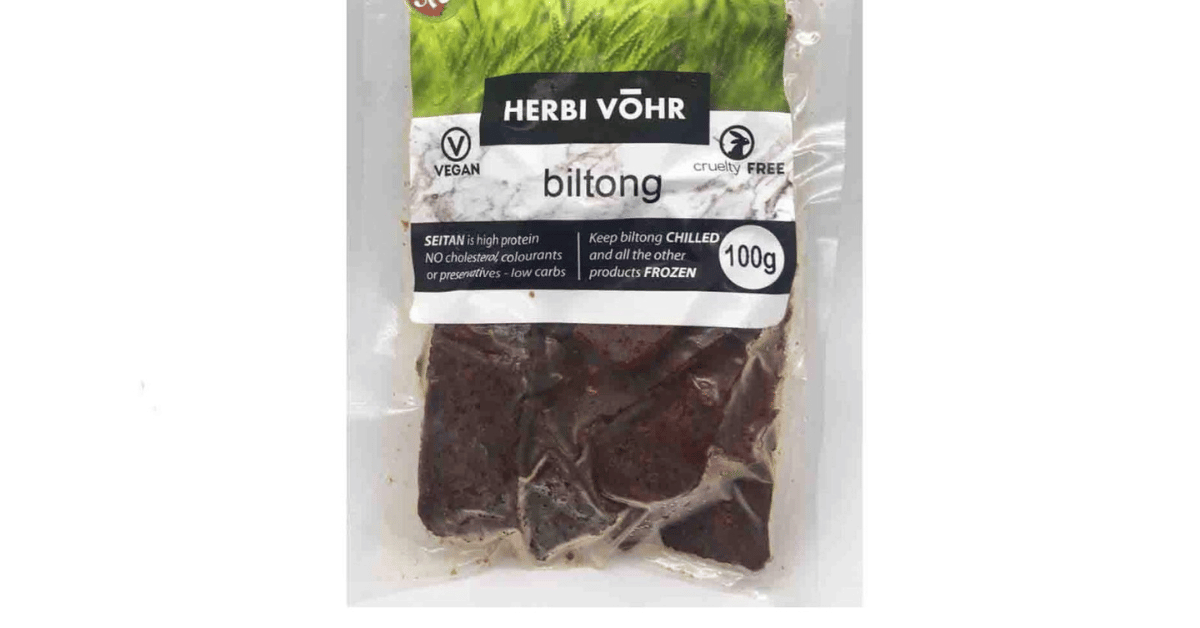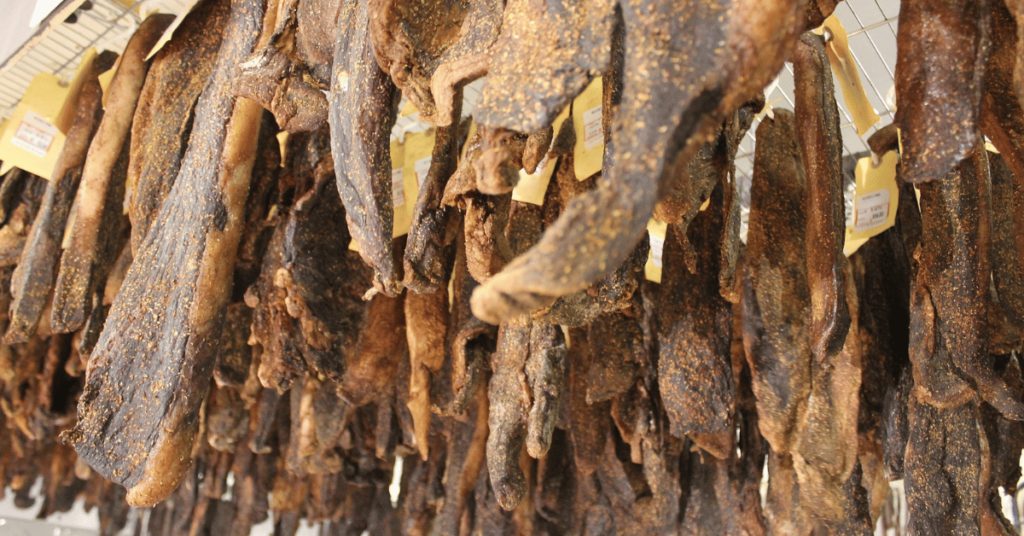Plant-Based Biltong South Africa

Biltong is South Africa’s beloved dried meat snack. It has long held a special place in the country’s culinary tradition.
Its unique flavour and texture have won over generations.
You can make it a staple for road trips, hikes, and everyday snacking.
But what if you crave that biltong experience without the meat?
Buckle up.
A new kind of biltong is storming the South African market: plant-based biltong.
This blog post is about plant-based biltong.
It explores how it mimics the classic South African favourite. Thus, it offers a tasty and sustainable alternative.
We’ll explore the reasons behind the rise of plant-based options.
We’ll look at the ingredients used to create this innovative snack and where you can find it.
Whether you’re a lifelong biltong fan or a curious newcomer to the plant-based world, join us.
We will discover the future of this iconic South African treat!
The Allure of Biltong: A South African Delight
Imagine a snack that’s both intensely satisfying and bursting with flavour.

Pixabay/scooterenglasias
This dish combines sweet, salty, and savoury flavours, creating an exciting experience for your taste buds with every bite.
This allure is the magic of biltong.
It is a South African dried meat delicacy that has wowed palates for generations.
Biltong isn’t just another jerky.
Unlike its North American cousin, biltong boasts a unique texture.
It’s air-dried, not cooked, which makes it softer and more tender. It practically melts in your mouth.
Drying intensifies the flavours. It creates a meaty and nuanced profile.
The magic starts with the spices.
Producers often marinate traditional biltong in a secret blend.
They include coriander, black pepper, rock salt, and vinegar.
This aromatic bath imbues the meat with a deep flavour that lingers long after the last bite.
But biltong’s allure extends beyond the taste.
It’s a symbol of South African ingenuity.
Dutch settlers developed biltong to preserve meat without refrigeration. It became a staple food for pioneers and explorers.
Today, people from all walks of life enjoy it, and it is a delicious reminder of the country’s rich heritage.
Biltong is great as a snack.
It’s also suitable for slicing and adding to salads or powdered for seasoning.
It offers a unique and tasty way to experience South African food.
It’s a taste of tradition, a burst of flavour, and a testament to the enduring power of culinary innovation.
Can this traditional cuisine meet the eclipse of plant-based revolution?
The Plant-Based Revolution Hits South Africa
South African food is changing. A growing appetite for plant-based options fuels it.
This trend isn’t just about trendy cafes and health food stores anymore.
It’s reaching mainstream consumers, driven by a confluence of factors:
Health-Conscious Choices
South Africans are increasingly prioritizing healthy eating habits.
Plant-based choices typically have less saturated fat and cholesterol. They are lower than traditional meat products.
Ethical Considerations
Some consumers are turning to plant-based alternatives.
They worry about how factory farming hurts animals and the environment.
The alternatives align with their values.
Environmental Awareness
The environmental benefits of plant-based proteins are undeniable.
Production requires less land and water than traditional meat farming. So, it’s a more sustainable choice.
Delicious Innovation
Gone are the days of bland, unappetizing vegetarian options. Today’s plant-based alternatives boast incredible flavour and texture, making the switch easier.
This revolution isn’t limited to tofu and lentils.
South African grocery stores now sell many plant-based meats. These include burgers, sausages, “pulled pork,” and “chicken” alternatives.
Various plant proteins make them, such as soy, pea, and mycoprotein (from fungi). They offer textures and flavours to please all cravings.
With all these innovations, where does plant-based biltong fit in?
Enter Plant-Based Biltong: A Game-Changer for Biltong Lovers
For those who love the taste and tradition of biltong. But, are taking the plant-based route.
Fear not!
Plant-based alternatives are innovative.
Manufacturers have taken a bold step into the realm of biltong.
This is a new twist on a South African classic. It offers a tasty and sustainable way to enjoy biltong.
And all without the meat.
The biltong is plant-based. It gets its meaty texture and flavour from a clever mix of plant proteins.
Think of lentils, seitan, or chickpeas. They season and marinate them to replicate the taste of traditional biltong.
These plant-based heroes are then air-dried. This method copies the usual drying process that gives biltong its texture.
But the magic doesn’t stop there.
Manufacturers get creative with spices and flavourings. They use them to capture the essence of classic biltong.
Expect familiar coriander, black pepper, and rock salt notes. Also, expect innovative flavour variations like peri-peri, barbecue, or a hint of smokiness.
Plant-based biltong is about more than just satisfying cravings.
It offers many advantages:
Ethical Choice
For animal welfare concerns, plant-based biltong is a guilt-free way to enjoy biltong.
Sustainable Option
Production requires less land and water than traditional meat. Thus making it a more eco-friendly choice.
Dietary Friendly
Many biltong options are plant-based, gluten-free, and vegan, making them accessible to those with dietary limits.
Are you a lifelong Biltong fan? Are you looking for a plant-based option? Or are you new to vegan snacks? If so, try plant-based biltong.
It’s a testament to culinary innovation. It offers a tasty and sustainable way to enjoy a South African tradition.
Impressive indeed.
But wait
Where will you get this plant-based biltong?
Hitting the Shelves: Where to Find Plant-Based Biltong
Good news for South Africans seeking plant-based biltong: finding it is getting easier.
It might be less common than traditional biltong. But here are your best bets for finding it:
Specialty StoresH
Health food stores and vegan/vegetarian shops are leaders. They stock plant-based alternatives.
They’ll likely have a selection of plant-based biltong brands to explore.
Online Retailers
The Internet provides a wider variety of choices.
Several South African online stores sell plant-based products. Many plant-based biltong makers have online stores for direct purchase.
Mainstream Grocery Stores
It has yet to be as common in grocery stores.
But, many big grocery stores are starting to sell plant-based biltong. Demand is growing.
Look at the vegetarian or healthy food sections.
Price Point
Plant-based biltong tends to be priced slightly higher than traditional biltong. This pricing reflects the cost of developing and producing these innovative products.
Environmental Impact
Plant-based biltong generally has a lower environmental footprint than traditional biltong.
Making plant protein needs less land and water than raising animals. It is a more sustainable choice.
The impact can vary. It depends on the production methods and ingredients.
Look for brands that prioritize sustainability in their practices.
Eating plant-based is becoming a norm in South Africa. Plant-based biltong is gaining traction and promises a bold future.
Biltong’s Bold Future: Tradition Meets Innovation
The future of biltong in South Africa is brimming with exciting possibilities.
Plant-based biltong is just the start of a trend. It promises to change this beloved South African snack.
Here’s a glimpse of what’s on the horizon:
Flavor Explosion
Expect a continued explosion of flavour innovation in plant-based biltong.
Manufacturers will likely try new spice mixes, international flavours, and even smoky or “braaied” options to cater to diverse palates.
Nutritional Powerhouse
The focus on health and wellness will drive the development of plant-based biltong.
Manufacturers will fortify it with extra nutrients, such as vitamins and minerals.
This fortification will make it an even better snack.
Accessibility for All
The popularity of plant-based biltong is growing. It will likely become more accessible and reasonably priced in regular grocery stores.
This trend will make it accessible to a broader range of consumers.
Traditional Evolution
The rise of plant-based alternatives might influence traditional biltong producers.
We might see a focus on sustainable sourcing and the creation of hybrid biltong products, which combine plant and animal proteins.
One thing’s sure: traditional or plant-based biltong is here to stay.
Its unique flavour, rich history, and versatility make it a favourite snack. South Africans love it.
So, next time you reach for biltong, take a moment to appreciate the innovation. It’s what’s keeping this South African tradition alive.
Conclusion
The future of plant-based biltong is a delicious fusion of tradition and innovation.
You might crave the classic air-dried meat experience. Or, you might want a plant-based alternative that aligns with your values.
Either way, there’s a biltong option to tantalize your taste buds.
So, take a bite.
Enjoy the unique flavours.
Join the journey as this South African legend keeps changing.
We may discover the next biltong revolution just around the corner!
